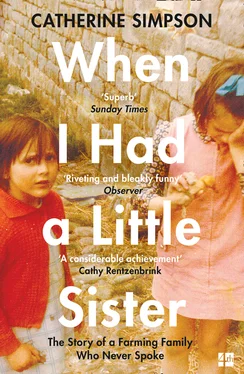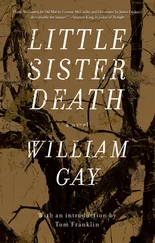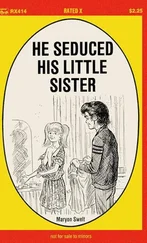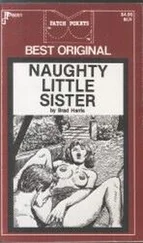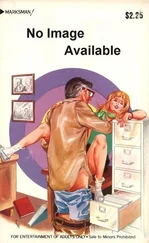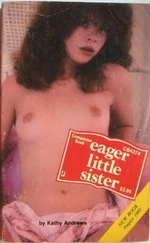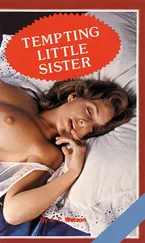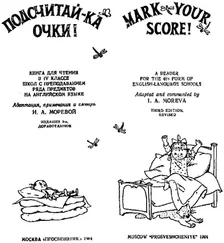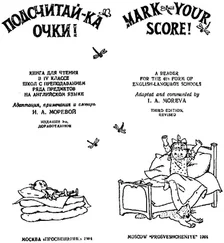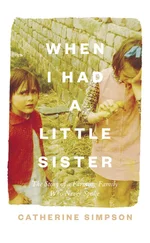We edged towards the coffin. I could see Grandad’s profile; it was him and yet not him. I wasn’t sure that embalming was such a good idea if it meant he would look like this for ever. His hands lay white and frozen on the shiny satin shroud. They looked different; they looked very clean. A farmer’s hands never look very clean, no matter how much they scrub them with globs of Swarfega. I learned years later when my own father was ill in hospital with the first of his bouts of cancer that if a farmer’s hands are not ingrained with soil he is either dangerously ill or he is already dead.
My mother leaned over the coffin and kissed Grandad’s cheek and I watched, horrified. I’d never seen my mother kiss anyone before, let alone a dead person.
I’d been reluctant to kiss Grandad when he was alive because he and my uncles had a habit of grabbing your face and rubbing their stubbly chins on you. This painful experience was known as a ‘chin pie’ and was supposed to be funny. It certainly made my uncles roar with laughter but it had made me wary. I knew on this occasion Grandad was not going to give me a chin pie but I still didn’t want to kiss him.
Elizabeth, Tricia and I inched nearer the coffin, side by side, halting at a safe distance. Grandad had been a generous man who regularly went to the cash-and-carry to buy sweets in wholesale quantities for his grandchildren and handed them out like Father Christmas every Sunday, yet bellowed at me for switching on the stair light in the farmhouse to find my way to the loo because I thought the turn in the creaking stairs was haunted. Grandad was a man who read Titbits yet disapproved of many things including a child using the word ‘pregnant’ (‘don’t let your grandad hear you saying that word’). Grandad travelled the world with Grandma Mary, including cruising to South Africa, yet I once saw him pluck a partially sucked sweet off my cousin’s jumper, say ‘waste not, want not’, and eat it. I had joined in games where he sat beside a doorway and tried to whack you with a rolled-up newspaper as you ran past, partly excited but mainly terrified.
‘Say goodbye to your grandad,’ my mother said. She started to cry. I watched, frozen.
I’d never seen my mother cry before either.
I learned when Grandad died that certain rituals follow a death; relatives gather together and speak in undertones and drink tea, but as kids my twenty-odd cousins and I had not yet learned to respect these rituals. On the Sunday after Grandad’s death, but before his funeral, we played Blind Man’s Buff along the farmhouse corridor like on any ordinary Sunday; except this time not only were we trying to evade the blindfolded ‘blind man’, we were trying not to touch the sitting-room door because it had dead-Grandad behind it. If one of the younger cousins stumbled against the door an older cousin would chant, ‘You’re haunted! You’re haunted!’ and the younger cousin would start blubbering, whereupon an aunt would poke her head out of the kitchen and hiss, ‘Ssssh! Don’t you know your grandad’s dead?’ as though there was a danger our racket would wake him up.
I wanted to go to Grandad’s funeral but was told, ‘No, and don’t ask again.’ Neither Elizabeth nor Tricia expressed any interest in going. My mother was knocked sideways by the death of her father and she probably thought she had enough on her plate without taking me. I considered this unfair – especially as this was not the first funeral I had been banned from attending.
Five years earlier, when I was four, I’d asked to go to my first funeral when Old Jack died.
Old Jack was our neighbour and looked like a manifestation of God himself – if God ever wore fustian breeches and lived in a red-brick cottage in the middle of Lancashire. He had white hair, a white moustache and a mahogany desk full of chocolate.
We took up his dinner (his midday meal) every day on the tractor the quarter of a mile from our farm. My dad drove and Elizabeth and I bounced along clinging to the tractor cab, struggling to keep the plate straight to stop the gravy and the peas from dribbling into our wellies.
We’d find him sunk in his armchair by the open fire. He wore a jacket and weskit and trousers shiny with age and of an indeterminate colour best described as ‘old’. He had pockets of mint imperials and barley sugars.
He was glad to see us and would greet us with a ‘How do’ and creak out of his chair and root around in his antique desk to find each of us an Aero bar. The desk had shiny black knobs down each side and soft fraying leather on top and a secret drawer. Old Jack showed us how to slide out one of the knobs to open the secret drawer.
Old Jack’s cottage had no running water, no electricity and no gas. It was 1968, and by then his wife had been dead more than thirty years. Old Jack had lived there on his own since his brother Old Jem died of lung cancer in 1962. Old Jem had never smoked but had spent every night huddled over the coal fire in the cottage to keep himself warm. Old Jack had had two brothers and a sister, all unmarried, who had lived with him after his wife died and who themselves then died at seven-year intervals – Agnes was the first to go in 1948. She was a woman with an ‘erratic mind’ who ‘fizzled out somehow or other’, as my father remembers it. Seven years later Bob shot himself with a 12-bore shotgun on the back cobbles of the cottage. Bob was seventy years old, newly retired and unable to face life without his job on the dykes.
My dad had been visiting Old Jack every Sunday evening since the 1940s and for years there had been games of Nap and Pontoon, with Agnes, Bob and Old Jem, playing for pennies; the oil lamp rocking on the table as they excitedly slapped down the cards.
By the time Old Jack died in 1968 we’d been delivering his meals by tractor every day for ten years and we were the closest thing he had to family.
A year or two earlier when Old Jack was well into his eighties, he’d turned up at our farm on his bike with his Last Will and Testament shoved in his weskit pocket. He was leaving the lot to my dad and another neighbour, he said; his tiny cottage, its contents and his ten-acre meadow with his cow in it. To Elizabeth he was leaving his ebony and gold antique chiming clock, to my baby sister Tricia he was leaving his Edwardian sofa, and to me he was leaving the loveliest thing I have ever been given – the beautiful antique writing desk with the shiny black knobs and the secret drawer full of chocolate.
Old Jack died ‘of old age’ in his sleep when he was eighty-six and he was laid out in an open coffin in the cottage’s tiny sitting room. I was four years old and wanted to go and see him.
‘I want to see Old Jack.’
‘No.’
‘I want to see him.’
‘Stop mithering.’
‘What does he look like?’
‘Like he’s asleep. Now stop mithering.’
‘Is he in bed?’
‘No, he’s in a coffin.’
‘What’s a coffin?’
(Sigh.) ‘It’s a box you get buried in. Now that’s enough.’
‘What kind of a box?’
‘Oak with brass handles. It’s a box that’s oak with brass handles.’
I thought about this. A few years later I would learn about oak boxes with brass handles; I would see them on The Dave Allen Show where they were usually balanced on the crossbars of bikes or slithering out of vans and sliding down hills chased by the vicar. But at the age of four I had never seen one and they intrigued me.
‘Can I go to the funeral?’
‘No.’
‘Why not?’
‘You’re too young.’
‘Why?’
‘Children don’t go to funerals. Don’t ask again.’
‘Why?’
‘Ask again and you’ll go to bed.’
Dad brought the antique desk from Old Jack’s with the tractor and trailer. He wrapped his long arms round it and staggered into the house with his knees bent. Unlike with Great-Great-Aunt Alice’s bracelet and evening bag, my mother did not consider the desk rubbish. She said, ‘That desk’s mahogany, it’s a Davenport – put it straight in the sitting room.’ That meant I’d only see it on Christmas Day or if somebody was born or if somebody died.
Читать дальше
